

5 tips to improve your critical thinking - Samantha Agoos. Evaluating Internet Sources. The questions below will help you in evaluate web pages for use as academic sources.
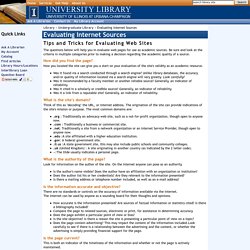
Be sure and look at the criteria in multiple categories prior to making a decision regarding the academic quality of a source. Evaluating Internet Resources. Unlike similar information found in newspapers or television broadcasts, information available on the Internet is not regulated for quality or accuracy; therefore, it is particularly important for the individual Internet user to evaluate the resource or information.
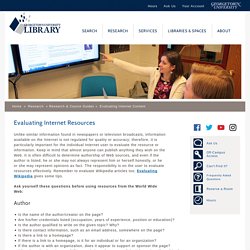
Keep in mind that almost anyone can publish anything they wish on the Web. How to evaluate website content. How do you tell when information you find on the internet is reliable?
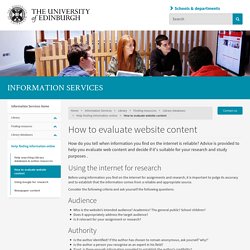
Advice is provided to help you evaluate web content and decide if it's suitable for your research and study purposes . Using the internet for research Before using information you find on the internet for assignments and research, it is important to judge its accuracy and to establish that the information comes from a reliable and appropriate source. Consider the following criteria and ask yourself the following questions: Audience Who is the website’s intended audience? Authority Is the author identified? Critical Thinking. What is critical thinking?
Thinking Skills. What do we mean by "Thinking Skills"?
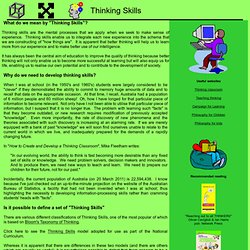
Thinking skills are the mental processes that we apply when we seek to make sense of experience. How to Teach Students to Evaluate the Quality of Online Information. The volume of information available on the Internet is astounding, and it just keeps growing.
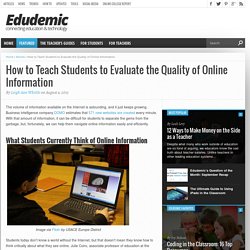
Business intelligence company DOMO estimates that 571 new websites are created every minute. With that amount of information, it can be difficult for students to separate the gems from the garbage, but, fortunately, we can help them navigate online information easily and efficiently. What Students Currently Think of Online Information Image via Flickr by USACE Europe District. Mandela Day. Mandela Day is on 18 July.
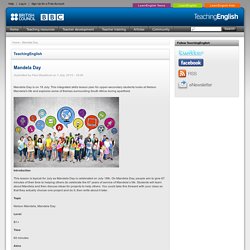
This integrated skills lesson plan for upper-secondary students looks at Nelson Mandela's life and explores some of themes surrounding South Africa during apartheid. Introduction This lesson is topical for July as Mandela Day is celebrated on July 18th. On Mandela Day, people aim to give 67 minutes of their time to helping others (to celebrate the 67 years of service of Mandela’s life. Students will learn about Mandela and then discuss ideas for projects to help others.
Topic Nelson Mandela, Mandela Day Level. Best Young Adult Novels, Best Teen Fiction, Top 100 Teen Novels. It's almost a cliche at this point to say that teen fiction isn't just for teens anymore.
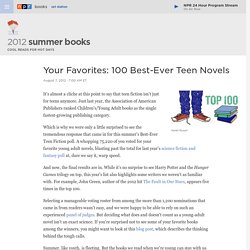
Just last year, the Association of American Publishers ranked Children's/Young Adult books as the single fastest-growing publishing category. Which is why we were only a little surprised to see the tremendous response that came in for this summer's Best-Ever Teen Fiction poll. A whopping 75,220 of you voted for your favorite young adult novels, blasting past the total for last year's science fiction and fantasy poll at, dare we say it, warp speed.
And now, the final results are in. Bob Geldof: The Moment - Video. Anne Frank A Project About Human Rights And To Do What Is Right. 24 Best Poems to Teach in Middle and High School. 25 must-read books to dive into this summer. Gender roles discussion and information gap - ESL speaking activity. The main focus of this class would be the discussion questions.
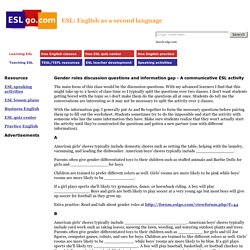
With my advanced learners I find that this might take up to 2 hours of class time so I typically split the questions over two classes. I don't want students getting bored with the topic so i don't make them do the questions all at once. Students do tell me the conversations are interesting so it may not be necessary to split the activity over 2 classes. Podcast: Gender Roles. Podcast: Gender Roles Whose job is it to take out the trash in your family?
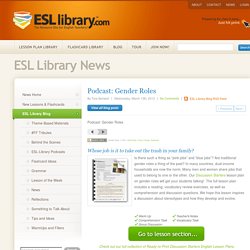
Is there such a thing as “pink jobs” and “blue jobs”? Are traditional gender roles a thing of the past? In many countries, dual-income households are now the norm. Many men and women share jobs that used to belong to one or the other. Check out our full collection of Ready-to-Print Discussion Starters English Lesson Plans. Coming soon to our podcast…Skateboarding. The 5 Step Model to Teach Students Critical Thinking Skills. Writing Quality. Film Education. Thinking Skills. Types of Plagiarism — Plagiarism.org - Best Practices for Ensuring Originality in Written Work. Plagiarism is not always a black and white issue.
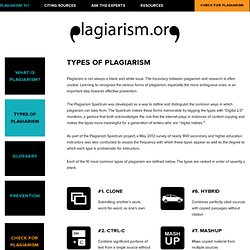
Study skills. Resources and Downloads for Teaching Critical Thinking. Tips for downloading: PDF files can be viewed on a wide variety of platforms -- both as a browser plug-in or a stand-alone application -- with Adobe's free Acrobat Reader program. Click here to download the latest version of Adobe Reader. Click on any title link below to view or download that file.
William Shakespeare. Dl-finley-53-ways-check-understanding. Formative assessment strategies for success. During a recent eSchool News webinar, experts revealed how formative assessment can support the curriculum A key takeaway was that formative assessment is a process, and not a “one moment in time” event. How can formative assessment be used to support the curriculum? This was the subject of a recent webinar sponsored by SunGard K-12 Education, during which two experts revealed their strategies for success. The panelists were John Phillipo, founder and executive director of the Center for Educational Leadership and Technology, and Bethany Silver, director of assessment, evaluation, and research for the Bloomfield, Conn., schools.
Moderating the discussion was Joel Hames, director of product management for SunGard. 10 Things I’m Looking for in an IB Teacher. By A. Student Being an IB student, I’ve got a lot of improvement to do. I’ve got to be an inquirer, knowledgeable, a thinker, communicator, principled, open minded, caring, a risk-taker, balanced, and reflective.
If I go through the complete IB continuum, which is to say starting my schooling in the Primary Years Programme when I’m 3-11 years old, moving onto the Middle Years Programme when I am 11-16, and then in the Diploma Programme when I’m 17-18, the core of my learning is centered around big ideas connecting concepts that spiral throughout my education; in the end, I am supposed to reach a development of awareness wherein I am able to take action, reflect, understand. Reading and literature. What Languages Sound Like.
Language B.